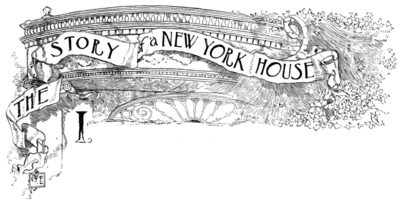
By H. C. Bunner.
"I hear," said Mrs. Abram Van Riper, seated at her breakfast-table, and watching the morning sunlight dance on the front of the great Burrell house on the opposite side of Pine Street, "that the Dolphs are going to build a prodigious fine house out of town–somewhere up near the Rynders's place."
"And I hear," said Abram Van Riper, laying down last night's Evening Post, "that Jacob Dolph is going to give up business. And if he does, it's a disgrace to the town."
It was in the summer of 1807, and Abram Van Riper was getting well over what he considered the meridian line of sixty years. He was hale and hearty; his business was flourishing; his boy was turning out all that should have been expected of one of the Van Riper stock; the refracted sunlight from the walls of the stately house occupied by the Cashier of the Bank of the United States lit with a subdued secondary glimmer the Van Riper silver on the breakfast-table–the squat tea-pot and slop-bowl, the milk-pitcher that held a quart, and the apostle-spoon in the broken loaf-sugar on the Delft plate. Abram Van Riper was decorously happy, as a New York merchant should be. In all other respects, he was pleased to think, he was what a New York merchant should be, and the word of the law and the prophets was fulfilled with him and in his house.
"I'm sure," Mrs. Van Riper began again, somewhat querulously, "I can't see why Jacob Dolph shouldn't give up business, if he's so minded. He's a monstrous fortune, from all I hear–a good hundred thousand dollars."
"A hundred thousand dollars!" repeated her husband, scornfully. "Ay, and twice twenty thousand pounds on the top of that. He's done well, has Dolph. All the more reason he should stick to his trade; and not go to lolling in the sun, like a runner at the Custom House door. He's not within ten years of me, and here he must build his country house, and set up for the fine gentleman. Jacob Dolph! Did I go on his note, when he came back from France, brave as my master, in '94, or did I not? And where 'ud he have raised twenty thousand in this town, if I hadn't? What's got into folks now-a-days? Damn me if I can see!"
His wife protested, in wifely fashion. "I'm sure, Van Riper," she began, "you've no need to fly in such a huff if I so much as speak of folks who have some conceit of being genteel. It's only proper pride of Mr. Dolph to have a country house, and——" (her voice faltering a little, timorously) "ride in and—and out——"
"Ride!" snorted Mr. Van Riper. "In a carriage, maybe?"
"In a carriage, Van Riper. You may think to ride in a carriage is like being the Pope of Rome; but there's some that knows better. And if you'd set up your carriage," went on the undaunted Mrs. Van Riper, "and gone over to Greenwich Street two years ago, as I'd have had you, and made yourself friendly with those people there, I'd have been on the Orphan Asylum Board at this very minute; and you would——"
Mr. Van Riper knew all that speech by heart, in all its variations. He knew perfectly well what it would end in, this time, although he was not a man of
